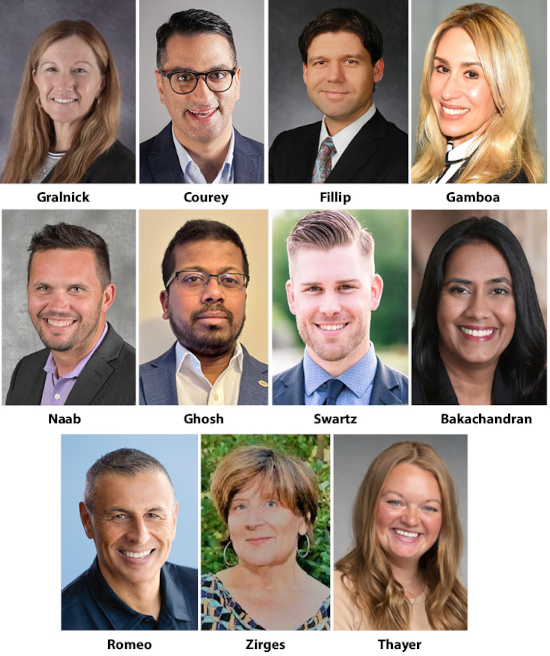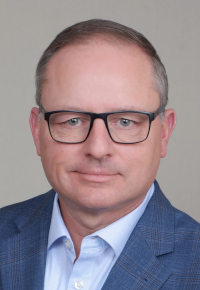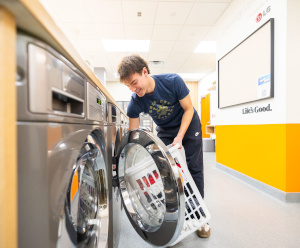
If you missed a news story, check our News Archive for the top stories.
Be sure to visit People and Product News while you’re catching up on all the latest. Check out our new JOBS page if you are looking for a job or a qualified employee.
FEBRUARY 2026 NEWS
Healthcare Laundry Accreditation Council Names 2026-2028 Board


HLAC is proud to welcome John Hopper as President, continuing his leadership and service to HLAC in this role.
The Board and Staff look forward to the guidance, expertise, and collaboration of the full HLAC Board as we move into the 2026–2028 term and continue to support excellence across the healthcare laundry community.
Other members of the Board:
Kelly Zabriskie Gralnick
HLAC Vice President
System Director-Infection Prevention & Control, BayCare
Jeffrey Courey
HLAC Past President
President & CEO, George Courey Inc.
Karl Fillip II
CEO, NOVO Health Services
Lumey Gamboa
CEO, Bay Linen
Cort Naab
Western Regional Manager, Tingue
Kaustav Ghosh
Director, RD&E – Global Textile Care, Ecolab
Nick Swartz
VP of Sales, Healthcare Linen Services Group
Dr. Priya Balachandran
CEO, Advisor, and Co-Founder, Life Sciences Tools and Digital Health Space
Rocco Romeo
CEO, HLS Linen Services
Christine Zirges
System Director Infection Prevention, SSM Health
Krissy Thayer
Executive Director
JANUARY 2026 NEWS
Laundry Lounge Powered by LG
Dorm project launched at University of Tennessee

LG Electronics USA announced the opening of the inaugural “Laundry Lounge powered by LG” at the University of Tennessee, at Knoxville.
Designed to simplify the process of doing laundry while encouraging connection and relaxation, the state-of-the-art laundry space transforms an essential chore into a more engaging and enjoyable experience. Located in Fred D. Brown Residence Hall, which houses 680 students, the newly reinvented space sets a new standard for campus laundry facilities.
This unique pilot project features 16 advanced LG commercial washers and 24 high-performance LG commercial dryers, complemented by extensive upgrades, fresh paint, sleek lighting, signage and stylish décor and furniture. Designed with students in mind, the space makeover goes beyond laundry by offering premium amenities such as a 65-inch LG OLED TV, LG monitors for gaming or studying, and an LG air purifier for ensuring a clean and refreshing environment.

A student uses the Laundry Lounge inside the Fred Brown Hall. (Photo by Steven Bridges/University of Tennesee)
For busy students on the go, LG’s Laundry Crew smartphone application enables them to remotely monitor their laundry cycles from their dorm room or class and receive notifications via their smartphone when their clothes are ready.
“At LG, we’re redefining the college laundry experience to make it more convenient, enjoyable and community oriented,” said Kevin Jeong, LG Electronics USA’s appliance division president. “The Laundry Lounge demonstrates our commitment to enhancing student life through convenience and connection by giving students a unique laundry experience that transforms a lengthy and tedious chore into an enjoyable and time-saving experience that complements dorm life.”
This project “reflects a shared commitment to innovation and to creating spaces that meaningfully support students in their everyday lives,” according to Frank Cuevas, Vice Chancellor of Student Life, University of Tennessee, Knoxville.
“The space a student calls home at UT is foundational to their academic success, personal development and well-being. Through our partnership with LG, the Laundry Lounge meets evolving student needs by elevating the residential experience with upgraded machines, modern amenities and smart technology,” he said.

Interior of the Laundry Lounge at Fred Brown Hall. (Photo by Steven Bridges/University of Tennesee)
The machines in the new Laundry Lounge include LG’s advanced Inverter Direct Drive™ motor innovation, delivering premium performance, durability and efficiency. They also feature LG’s innovative 3D Gyro Sensor and Gyro Balancing System, which precisely monitors drum movement to reduce unnecessary motion, vibration and noise.
LG’s commercial washers and dryers are also equipped with intuitive, easy-to-use interfaces tailored for all levels of experiences, paired with intelligent features such as advanced sensor technology designed to address common challenges like using excessive detergent.
Students attending the opening of the lounge at Brown Hall received a complimentary LG laundry bag and laundry detergent from Procter & Gamble to celebrate the launch of the new space.
For news earlier than the articles above, please visit the New Archives.



Can our Canadian Scholarship cover the cost of the webinars for non-members?
EDITOR’S NOTE: We checked with Mary Scalco at DLI, and she said that scholarships can be used for online classes, just like in-person courses.